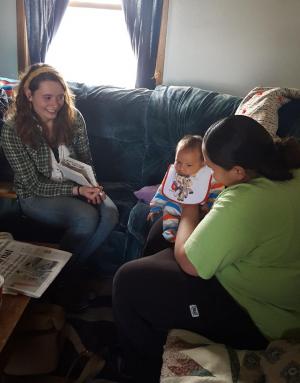Community Engagement at Pine Ridge
By Noah Strauss Jenkins ’18

Over spring break last April, photography professor John Willis and a group of students traveled to the Pine Ridge Reservation, in South Dakota, a continuation of the close relationship John has maintained with the Oglala Lakota Sioux community there for 25 years. He says there has been a tendency for outsiders to come into the reservation with big promises that they never make good on, making the community wary, so the group focused on helping where they could and meeting people through that process.
“We met a lot of amazing people, and had a lot of amazing experiences that I believe were very eye-opening for everyone,” says John. “Marlboro students were doing collaborative community engagement, where you are there to work with the community, rather than just coming by and trying to save ‘people in need.’ They had a clear awareness that they would benefit from the experience more than those they went to work with, but did what they could to make it useful for all.”
“For me the trip was focused more on connecting with the people who live there, and learning about their lives and the challenges that come with living there,” says junior Chris Lamb, one of the six students who participated. “The history of how they were forced onto ‘the rez’ by whites was something that was always present in my mind. It was also about the beauty that still lives there, in their families and communities.”
The trip was designed to teach students about modes of service and Lakota culture, and to show that the culture on the reservation is very dynamic despite being one of the poorest communities in America. Students met with families and elders to talk about the politics surrounding their land, gender roles, and family traditions, and also had the opportunity to meet with spiritual leaders and participate in ceremonies.
“We loved being able to spend time with families in their homes, and having the opportunity to really try and see into their lives,” says junior Cait Mazzarela. “They were really open, and shared a lot about their beliefs and lives, and it’s amazing to be able to get an inside look.”
The students raised money to make the trip possible for each of them, regardless of their ability to pay, and had enough extra to donate funds to several programs they were involved with there. One of these is B.E.A.R. (Be Excited About Reading), an after-school program working with suicide prevention and giving youth better alternatives, including counseling efforts, academic help, sporting opportunities, and healthy snacks for youth. The students also assisted the tribal radio station with fundraising and helped the high school set up a student online newsletter, including buying three cameras for their use.
Another way the group decided to assist the B.E.A.R. project was through skateboarding, which has proven to be a respected alternative for youth on the reservation. The tribe has built an impressive skate park for this purpose, but most of the equipment they have available is poor quality. Marlboro College staff carpenter Brent Johnston used his connections in the skateboarding world to access quality equipment, at cost, from a manufacturer. The group purchased several sets of boards and helmets, aided by personal contributions from Brent, President Kevin Quigley, and Plant and Operations Director Dan Cotter.
In each case, the students responded directly to the needs that were presented, collaborating with a community that was still deeply immersed in their culture and tradition. “Underneath the struggles we hear about, there is a lot of resilience and pride in their traditional ways,” says John. “There are a lot of strong and motivated people trying to do good out there, trying to save their culture, a culture filled with beliefs and practices we all would benefit from understanding.”
